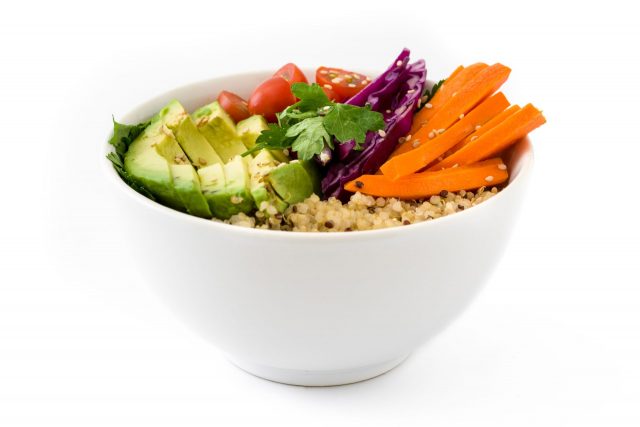The Cancer Research
In some studies, vegan diets seem to be associated with the best long-term health, and they’re the only dietary pattern that’s been linked with reversal of atherosclerosis in very limited subjects. Beyond meeting the recommendation for a plant-based diet, the evidence is too limited to allow any conclusions about a vegan diet as a specific choice for reducing cancer risk, concluded AICR’s Third Expert Report.
Current Evidence
- Overall Cancer. Evidence from long-term observational population studies shows vegan diets consistently linked to lower cancer risk, but no more so than other vegetarian diets or other kinds of eating habits that focus on whole plant foods. For example, vegetarian diets as a whole are associated with a lower risk of colorectal cancer, but vegan diets don’t show additional protection.
- Prostate Cancer. In a large U.S. study, compared to non-vegetarians, men following a vegan diet were 35 percent less likely to develop prostate cancer. In this group of men, vegan diets were the only form of vegetarian diet linked with lower prostate cancer, and this association remained even after adjusting results of the analysis for weight. There was a trend for lower risk of advanced forms of prostate cancer, the types of greatest health threat, but the link was less clear than for overall prostate cancer.
- Breast Cancer. In the U.S.-based Adventist Health Study 2, compared to non-vegetarians, women following a vegan diet showed a trend for lower risk of breast cancer, but it was not clear whether the association occurred by chance or from other influences.
Important Insights
- More on Vegan Diet
What you do eat as well as what you don’t eat counts. Studies of vegan and other vegetarian diets, and their association with cancer risk or other aspects of health, sometimes show different results. A closer look suggests that part of the difference may reflect the importance of specific food choices.
- People who follow a vegan diet, omitting all animal-based foods, but include frequent use of sweets, refined grains, sugar-sweetened beverages and unhealthy choices of added fats do not show as much health benefit. People following a vegan diet who limit these foods and include abundant vegetables, legumes (dry beans, peas, lentils, and soy foods), nuts and seeds tend to show lowest risk of cancer and heart disease.
- Overall, people in studies who follow vegan diets tend to also consume little or no alcohol, avoid tobacco, get regular physical activity, and maintain a healthy weight. Although researchers try to adjust for these factors in their statistical analysis, the overall lifestyle of people who follow vegan diets may be reflected in the health benefits seen.
Weight as a complicating factor. People following a vegan diet are less likely to have overweight or obesity, which is another way that these eating habits help reduce risk of cancer. But simply eliminating all animal foods does not necessarily lead to a healthy weight for people who eat more calories than they need, especially if they frequently include large portions of foods or drinks high in added sugars or fats.
Featured Studies
- Tips for Following a Vegan Diet
- Vegan diets include only whole grains, vegetables, fruits, pulses (like dry beans, lentils and soy foods), nuts and seeds. They avoid all foods (sometimes even honey) that come from animals.
- Despite commonly-heard fears, these diets can meet all nutrient needs, depending on specific food choices. For example, it’s important to include beans, seeds, nuts and whole grains more than just a few times a week. Also, if you don’t use cereal, plant-based milk, nutritional yeast or other foods fortified with B-12, then a B-12 supplement is needed.
- Vegan diets are a great source of ideas for how to use dry beans, lentils, nuts and seeds in a wide range of delicious dishes. Think “outside the box” to see how they work well at breakfast, in salads and soups, and for snacks.
- A vegan diet can help avoid unhealthy weight gain by keeping hunger satisfied with high-fiber foods while limiting foods concentrated in calories. This would contribute to lower cancer risk. But simply eliminating all animal foods does not necessarily lead to a healthy weight if you eat bigger portions than you need, especially with a lot of foods or drinks high in added sugars or fats.
From the Blog
References
- World Cancer Research Fund/American Institute for Cancer Research. Diet, Nutrition, Physical Activity and Cancer: a Global Perspective. Continuous Update Project Expert Report 2018. Available at dietandcancerreport.org.
- Orlich MJ, Chiu THT, Dhillon PK, et al. Vegetarian Epidemiology: Review and Discussion of Findings from Geographically Diverse Cohorts. Advances in Nutrition. 2019;10(Supplement_4):S284-S295.
- Segovia-Siapco G, Sabaté J. Health and sustainability outcomes of vegetarian dietary patterns: a revisit of the EPIC-Oxford and the Adventist Health Study-2 cohorts. Eur J Clin Nutr. 2019;72(1):60-70.
- Orlich MJ, Singh PN, Sabate J, et al. Vegetarian Dietary Patterns and the Risk of Colorectal Cancers. JAMA Intern Med. 2015.
- Tantamango-Bartley Y, Knutsen SF, Knutsen R, et al. Are strict vegetarians protected against prostate cancer? Am J Clin Nutr. 2016;103(1):153-160.
- Penniecook-Sawyers JA, Jaceldo-Siegl K, Fan J, et al. Vegetarian dietary patterns and the risk of breast cancer in a low-risk population. British Journal of Nutrition. 2016;115(10):1790-1797.






